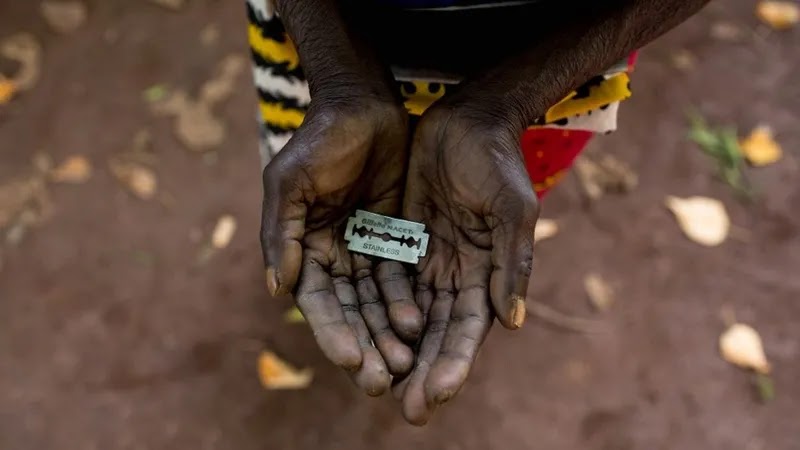Female Genital Mutilation (FGM) is still in practice in Africa, the Middle East, Asia, and Latin America according to the United Nations.
In the West African nation of Ivory Coast, a disturbing practice tied to female genital mutilation (FGM) continues to exist to this date, despite being banned for years.
 |
| Getty Images |
According to the United Nations (UN), It's estimated that 200 million girls and women alive today have undergone some form of FGM.
Although primarily concentrated in 30 countries in Africa and the Middle East, it is also practiced in some countries in Asia and Latin America. And amongst immigrant populations living in Western Europe, North America, Australia, and New Zealand, the UN says.
Some regions in the country use the excised genitalia of young girls to create "magical" potions believed to grant power, financial success, or political influence These potions are often made from the clitoris of girls who have undergone FGM, a deeply embedded cultural practice in parts of West Africa as reported by AFP.
Moussa Diallo, a former witch doctor who now campaigns against FGM, shared his past experiences with AFP without revealing his real identity. Diallo would apply a potion made from ground clitorises to his face and body, believing it would help him "dominate" and become a "big chief."
 |
| Tool used in FGM / Getty Images |
The practice, as Diallo described, involved drying the removed genitalia for up to two months before grinding them into a fine "black powder." This powder would then be mixed with various plant materials such as leaves, roots, bark, or shea butter which is often used in cosmetics. The belief in the magical power of these potions is still prevalent, especially in rural areas where traditional customs are rooted deep.
The Mutilated Genitalia Trade is a Profitable Business
The trade of mutilated genitalia is a lucrative business. Diallo recalled that the powder made from a virgin's clitoris could sell for around 100,000 CFA Francs (about $170), equivalent to the monthly earnings of many Ivorian families. If the girl had already given birth, the price would drop to 65,000 CFA Francs (about $99). In some cases, these body parts were traded for goods or services in the region's black market.
 |
| Photo: @WHO / X |
FGM has long been practiced across various religions in West Africa, with girls typically undergoing the procedure between childhood and adolescence.
Many families see it as a rite of passage or a way to suppress female sexuality. Still, organizations like UNICEF have consistently condemned it as a violation of girls' fundamental rights.
FGM Procedure Could be Fatal
According to the reports the physical and psychological damage caused by FGM is extensive, leading to severe health risks such as infection, sterility, birth complications, and loss of sexual pleasure. In some cases, the procedure can even be fatal.
Despite the Ivory Coast having banned FGM over 25 years ago, the practice still exists. According to the OECD (The Organization for Economic Cooperation and Development), one in five Ivorian women is still subjected to genital cutting, with rates rising to one in two in the northern regions of the country.
One of the significant barriers to eliminating FGM is the secret trade of body parts for mystical purposes. Diallo and others interviewed by AFP explained that the genitalia removed during FGM are sometimes sold or used in rituals that are believed to provide protection or power.
Lieutenant N’Guessan Yosso, a regional police chief, confirmed that dried clitorises are still "very sought-after for mystical practices." However, no official police investigations have been launched regarding the trafficking of mutilated organs.
 |
| Image - UNICEF |
This lack of legal action partly comes from the secrecy surrounding the practice and the fear of discussing sacred customs. The cutters themselves, often feared and respected, operate in secret, hiding their activities behind traditional festivals that serve as a cover for illegal circumcision ceremonies.
The Magical Properties of Clitorises
Anthropologists and researchers who have studied the phenomenon report that the belief in the magical properties of clitorises remains strong in some regions. Farmers in Denguele district, for instance, mix clitoris powder with seeds to increase the fertility of their fields.
Women in central-west Ivory Coast use the powder as an aphrodisiac, hoping to prevent their husbands from straying. Blood from women who have undergone FGM is also used in rituals to honor traditional gods.
While some circumcisers claim that the removed genitalia are buried or thrown into a river, others admit that they are sold for mystical purposes. The trade-in of mutilated genitalia is considered "organ trafficking" under Ivorian law and is punishable by fines and imprisonment. However, few arrests have been made and the trade continues largely unchecked due to its secrecy.
However, the existence of these practices has made it difficult to eliminate FGM, which remains active in some parts of the Ivory Coast despite efforts by NGOs and government campaigns.
Read more: Rare Beauty Founder Selena Gomez Becomes a Billionaire
Read more: Taylor Swift Officially Endorses Kamala Harris For President of the United States

